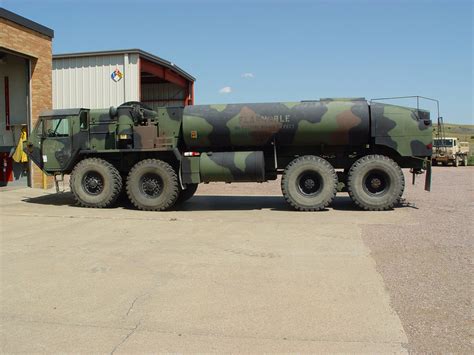Army Fuel Tanker: Efficient Transportation For Military Operations

The Army Fuel Tanker is a vital component of military logistics, ensuring the smooth and efficient transportation of fuel to support various operations. This specialized vehicle plays a crucial role in maintaining the mobility and operational readiness of military forces, especially in remote and challenging environments. In this comprehensive overview, we will delve into the features, capabilities, and significance of Army Fuel Tankers, exploring their design, performance, and impact on military operations.
Design and Construction of Army Fuel Tankers

Army Fuel Tankers are engineered to meet the rigorous demands of military operations, with a focus on durability, versatility, and safety. These tankers are typically built with a robust steel or aluminum frame, ensuring structural integrity and resistance to harsh conditions. The tank itself is designed with advanced materials and technologies to optimize fuel capacity, minimize weight, and prevent leaks or spills.
The tankers are equipped with advanced navigation and communication systems, allowing for precise tracking and coordination during transportation. They often feature advanced driver assistance systems (ADAS) and advanced safety features to enhance driver control and reduce the risk of accidents. Additionally, the tankers are designed with a modular layout, enabling customization based on specific mission requirements.
Key Design Elements:
- Robust Chassis: The tanker’s chassis is designed to withstand off-road conditions, providing stability and maneuverability in rough terrain.
- Fuel Tank Capacity: Army Fuel Tankers typically have a large fuel capacity, ranging from thousands of gallons to meet the demands of extensive operations.
- Advanced Pumping Systems: These tankers are equipped with high-performance pumps and dispensers, allowing for efficient and precise fuel transfer.
- Environmental Considerations: Modern Army Fuel Tankers incorporate eco-friendly features, such as leak detection systems and spill containment measures, to minimize environmental impact.
| Tank Material | Capacity Range |
|---|---|
| Steel | 5,000 - 10,000 Gallons |
| Aluminum | 8,000 - 12,000 Gallons |

Performance and Operational Capabilities

Army Fuel Tankers are designed to excel in diverse operational environments, ensuring reliable fuel delivery even in the most challenging conditions. These tankers are engineered to navigate through rough terrain, including mountainous regions, deserts, and densely forested areas, making them a crucial asset for military operations worldwide.
Key Performance Indicators:
- Off-Road Capability: Army Fuel Tankers are equipped with powerful engines and advanced suspension systems, allowing them to traverse rough terrain with ease.
- Fuel Efficiency: Despite their large fuel capacity, these tankers are designed with fuel-efficient engines, minimizing operational costs and maximizing range.
- Rapid Deployment: The modular design of Army Fuel Tankers enables rapid deployment, ensuring that fuel can be delivered to remote locations quickly and efficiently.
- Versatility: These tankers can be adapted to carry different types of fuel, including diesel, gasoline, and aviation fuel, making them versatile for various military operations.
The advanced pumping systems of Army Fuel Tankers allow for precise and controlled fuel transfer, ensuring efficient refueling of military vehicles and aircraft. Additionally, these tankers are often equipped with specialized equipment for emergency fuel distribution, further enhancing their operational capabilities.
Operational Scenarios:
- Desert Operations: Army Fuel Tankers play a crucial role in supporting military operations in desert environments, where access to fuel stations is limited.
- Mountainous Terrain: In mountainous regions, these tankers navigate steep inclines and rough roads, ensuring a steady supply of fuel to forward operating bases.
- Humanitarian Aid: Army Fuel Tankers are also utilized in humanitarian missions, providing fuel for emergency generators and power systems in disaster-stricken areas.
Impact on Military Operations

The deployment of Army Fuel Tankers has a significant impact on the success and efficiency of military operations. By ensuring a steady and reliable supply of fuel, these tankers contribute to the overall operational readiness and mobility of military forces.
Advantages of Army Fuel Tankers:
- Enhanced Mobility: With a consistent fuel supply, military vehicles and aircraft can operate with greater freedom, covering larger distances and accessing remote locations.
- Reduced Logistics Burden: The use of Army Fuel Tankers minimizes the need for frequent fuel resupply missions, reducing the overall logistics burden and freeing up resources for other critical tasks.
- Strategic Flexibility: The versatility and rapid deployment capabilities of these tankers allow military commanders to adapt to changing operational requirements, ensuring a flexible and responsive logistics system.
- Improved Mission Success: By ensuring a steady fuel supply, Army Fuel Tankers contribute to the overall success of military missions, enabling forces to achieve their objectives efficiently.
The design and performance of Army Fuel Tankers have evolved significantly over the years, incorporating advancements in technology and materials. As military operations continue to evolve, these tankers will play an increasingly vital role in maintaining the operational readiness and effectiveness of armed forces worldwide.
What is the average lifespan of an Army Fuel Tanker?
+The average lifespan of an Army Fuel Tanker can vary depending on several factors, including usage intensity, maintenance, and environmental conditions. On average, these tankers can last for approximately 20-25 years with proper care and maintenance. Regular inspections, timely repairs, and adherence to manufacturer guidelines are crucial for extending their lifespan.
How are Army Fuel Tankers maintained and serviced?
+Army Fuel Tankers require regular maintenance and servicing to ensure optimal performance and safety. This includes routine inspections of the tank, chassis, and mechanical components, as well as periodic servicing of the engine, transmission, and other critical systems. Specialized maintenance teams and technicians are trained to perform these tasks, ensuring that the tankers remain in top condition.
Can Army Fuel Tankers be customized for specific missions?
+Yes, Army Fuel Tankers can be customized to meet the unique requirements of specific missions. This customization can include modifications to the tank capacity, the addition of specialized equipment, or the integration of advanced communication and navigation systems. The modular design of these tankers allows for flexibility in adapting to different operational scenarios.



